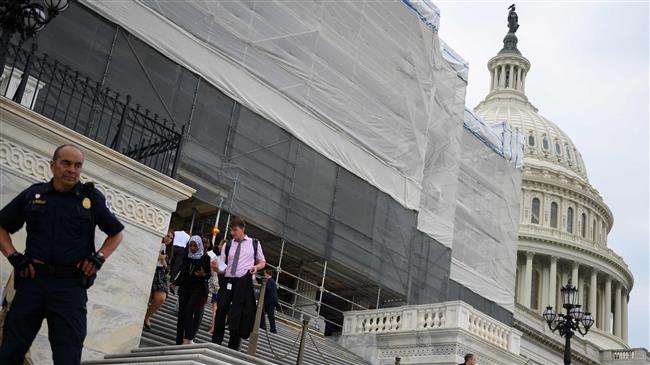US House votes to block Saudi arms sales, Trump to veto
The US House of Representatives has voted to pass resolutions that block the sale of precision-guided munitions (PGMs) to Saudi Arabia and the United Arab Emirates over their crimes against the people of Yemen, defying veto threats by President Donald Trump.
Almost a month after the Senate approved 22 resolutions against Trump’s plan to bypass Congress and press ahead with a major weapons deal with Riyadh and Abu Dhabi, the House approved three of the resolution largely along party lines.
The resolutions seek to block the sale of precision-guided munitions and related products by Raytheon, a major Pentagon contractor, to the two Arab countries.
In May, Trump citied what he called new threats from Iran to use an "emergency" loophole in the US arms control law to bypass Congress and complete the sale of more than $8 billion in weapons to Saudi Arabia, the UAE and Jordan.
The Arms Export Control Act gives Congress the power to review major weapons sales.
Aides to the Democratic leaders of the House said they gave priority to the three resolutions that were passed on Wednesday because the PGMs could be delivered quickly.
Some lawmakers have warned that the UAE and Saudi Arabia are using the missiles and other American weapons against civilians in their war against the impoverished Yemen.
The war which began in March 2015, has so far killed thousands of Yemeni women and children and destroyed Yemen’s infrastructure.
Moreover, many members of Congress, including some of Trump’s closest Republicans allies, have grown frustrated by what they see as Trump’s embrace of Saudi Arabia.
Since the beginning of the war on Yemen and in the aftermath of the murder of dissident Saudi journalist Jamal Khashoggi by Riyadh’s agents last October, a large group of lawmakers have urged Trump to pressure the kingdom to improve its human rights record.
Senate’s backing of the resolutions marked a rare occasion where the Republican-led chamber has opposed Trump’s foreign policy.
“This is a strong message, I think, that our values must guide our foreign policy,” Democratic Representative Eliot Engel, the chairman of the House Foreign Affairs Committee, said ahead of the vote.
Trump has said time and again that he is not willing to go after Saudi Arabia, and in particular the kingdom’s de facto ruler Crown Prince Mohammed bin Salman, arguing that Riyadh is a far more important partner in the Middle East and vital to Israel’s security.
Trump also views weapons exports to Riyadh and other Arab regimes of the Persian Gulf region as a way to generate jobs back home.
The Trump administration has in the past criticized Democrats in Congress for blocking the planned sales.
Currently, there are several bill making their way through Congress with Saudi-related provisions and the Senate Foreign Relations Committee is due to vote on two such bills next Tuesday.
One of the bills, brought by seven Republican and Democratic senators, calls for sanctions aimed at encouraging a peaceful resolution to the Yemen war, addressing the humanitarian crisis and holding Khashoggi’s killers responsible.
The other would demand an in-depth review of US-Saudi policy and bar many members of the Saudi royal family entry to America.
‘All wars have rules. All of those rules have been broken’ by Israel
VIDEO | Report flags India’s violation of rights of Rohingya detainees
Turkey's foreign minister meets Syria's de facto leader in Damascus
'Next to impossible' to rescue patients from Gaza's Kamal Adwan Hospital: Director
VIDEO | Vietnam current prosperity
Report blames gasoil exports for shortage at Iranian power plants
VIDEO | Hind Rajab Foundation names Israeli war criminals vacationing after Gaza genocide
VIDEO | Australians rally for Gaza ahead of Christmas festivities












 This makes it easy to access the Press TV website
This makes it easy to access the Press TV website